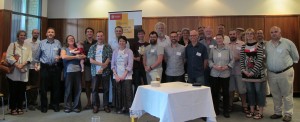ExSite9 is an open-source cross-platform tool for creating descriptions of files created during fieldwork. We have been working on the development of ExSite9 over the past year and it is now ready for download and use: http://www.intersect.org.au/exsite9 https://github.com/IntersectAustralia/exsite9/wiki/Install-packages
ExSite9 collects information about files from a directory on your laptop you have selected, and presents it to you onscreen for your annotation, as can be seen in the following screenshot. The top left window shows the filenames, and the righthand window shows metadata characteristics that can be clicked once a file or set of files is selected.The manual is here: http://bit.ly/ExSite9Manual
Researchers who undertake fieldwork, or capture research data away from their desks, can use ExSite9 to support the quick application of descriptive metadata to the digital data they capture. This also enables researchers to prepare a package of metadata and data for backup to a data repository or archive for safekeeping and further manipulation.
Scholars in the Humanities, Arts and Social Sciences (HASS) typically need to organise heterogeneous file-based information from a multitude of sources, including digital cameras, video and sound recording equipment, scanned documents, files from transcription and annotation software, spreadsheets and field notes.
The aim of this tool is to facilitate better management and documentation of research data close to the time it is created. An easy to use interface enables researchers to capture metadata that meets their research needs and matches the requirements for repository ingestion.
Read more
 Follow
Follow
